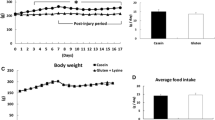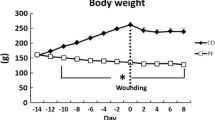Abstract
Objectives
It has been shown that wound healing in the rat is associated with increased protein synthesis at the site of the wound 48 hours after surgical trauma. The aim of the current study was to examine the effect of protein malnutrition prior to abdominal surgery on the capacity for muscle protein synthesis both at the site of the wound and in undamaged abdominal muscle.
Design and Measurements
Thirty-two rats were randomly assigned to a low or high protein diet (3% and 20% casein respectively). After two weeks, half the rats in each group underwent abdominal surgery. Forty-eight hours after the operation all the animals were killed and tissues were analysed for RNA and protein contents.
Results
The capacity for protein synthesis, as indicated by the RNA:protein ratio, was increased at the site of the healing wound. The low protein diet caused a decrease in the capacity for protein synthesis in unoperated animals but did not prevent the increase associated with wound healing.
Conclusion
The capacity to increase protein synthesis during wound healing is protected against the effects of malnutrition, indicating that it has a high biological priority.
Similar content being viewed by others
References
Emery, P.W., Metabolic changes in malnutrition. Eye, 2005; 19(10): p. 1029–1034.
Lee, V.M., et al., Muscle protein metabolism of rats in surgical trauma. JPEN J Parenter Enteral Nutr, 1988; 12(5):445–451.
Posthauer, M.E., The role of nutrition in wound care. Adv Skin Wound Care, 2006; 19(1):43–52; quiz 53–4.
Demling, R.H., The incidence and impact of pre-existing protein energy malnutrition on outcome in the elderly burn patient population. J Burn Care Rehabil, 2005; 26(1):94–100.
Barbul, A. and W.A. Purtill, Nutrition in wound healing. Clin Dermatol, 1994; 12(1):133–140.
Spanheimer, R.G. and B. Peterkofsky, A specific decrease in collagen synthesis in acutely fasted, vitamin C-supplemented, guinea pigs. J Biol Chem, 1985; 260(7):3955–3962.
Krajcovicova-Kudlackova, M., L. Ozdin, and P. Bobek, Protein synthesis in growing and adult rats on casein and gluten nutrition. Physiol Res, 1993; 42(1):17–22.
Grimble, R.F. and G.K. Grimble, Immunonutrition: role of sulfur amino acids, related amino acids, and polyamines. Nutrition, 1998; 14(7–8):605–610.
Martensson, J., J. Larsson, and H. Nordstrom, Amino acid metabolism during the anabolic phase of severely burned patients: with special reference to sulphur amino acids. Eur J Clin Invest, 1987; 17(2):130–135.
Arnold, M. and A. Barbul, Nutrition and wound healing. Plast Reconstr Surg, 2006; 117(7 Suppl):42S–58S.
Emery, P.W. and A. Ghusain-Choueiri, Effect of surgical trauma on muscle protein synthesis in the rat. Br J Surg, 1994; 81(4):539–542.
Emery, P.W. and P. Sanderson, Effect of dietary restriction on protein synthesis and wound healing after surgery in the rat. Clin Sci (Lond), 1995; 89(4):383–388.
Lowry, O.H., et al., Protein measurement with the Folin phenol reagent. J Biol Chem, 1951; 193(1):265–275.
Millward, D.J., et al., Relationship between protein synthesis and RNA content in skeletal muscle. Nature, 1973; 241(5386):204–205.
O’Leary, M.J., et al., Influence of starvation, surgery, and sepsis on cardiac protein synthesis in rats: effects of parenteral nutrition, glutamine, and growth hormone. Shock, 2002; 18(3):265–271.
Garlick, P.J., et al., The effect of protein deprivation and starvation on the rate of protein synthesis in tissues of the rat. Biochim Biophys Acta, 1975; 414(1):71–84.
Hunt, T.K., H. Hopf, and Z. Hussain, Physiology of wound healing. Adv Skin Wound Care, 2000; 13(2 Suppl):6–11.
Irvin, T.T., Effects of malnutrition and hyperalimentation on wound healing. Surg Gynecol Obstet, 1978; 146(1):33–37.
Munro H.N. and Fleck A., Analysis of tissues and body fluids for nitrogenous constituents. In: H.N. Munro, Editor, Mammalian Protein Metabolism Vol. 3, Academic Press, New York, N.Y. (1970), 423–525.
Author information
Authors and Affiliations
Corresponding author
Rights and permissions
About this article
Cite this article
Costarelli, V., Emery, P.W. The effect of protein malnutrition on the capacity for protein synthesis during wound healing. J Nutr Health Aging 13, 409–412 (2009). https://doi.org/10.1007/s12603-009-0076-z
Received:
Accepted:
Published:
Issue Date:
DOI: https://doi.org/10.1007/s12603-009-0076-z




